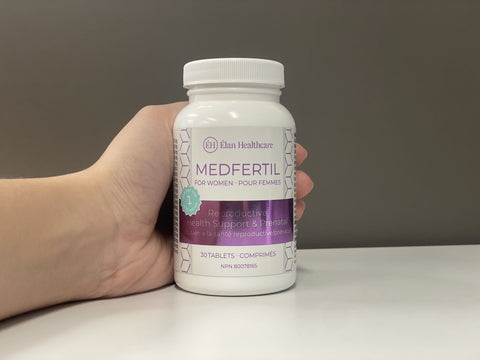Table of contents
The time it takes to get pregnant varies for everyone. You may conceive quickly or you may need to keep trying for longer. There’s no set time frame so don’t be upset or despondent if you don’t fall pregnant as soon as you start trying for a baby. When you’re no longer using contraception and are having regular sex with your partner, which is every 2 to 3 days, you should hopefully fall pregnant within 6 months to a year. Various factors affect your ability to conceive, including your age, health, and lifestyle. We’ll go through these in more detail below.
Your age affects your ability to get pregnant
When you’re born, all of the eggs your body will ever have are contained in your ovaries. This means their number reduces as you grow older. Not only that, the health of those eggs will decline over the years. This means that the younger you are when trying to conceive, the better your odds as you have a bigger supply of healthy eggs.
You have the best chances of falling pregnant when you’re in your 20s with the average time for conception being about 6 months. In your early 30s, the average time increases to a year. When you reach 35, your fertility declines at a faster rate. Once you hit 40, your likelihood of getting pregnant within a year reduces to 30%, and the average time for conception increases substantially to 26 months. From 45 years old, you only have a 5% chance of getting pregnant within a year while it’s uncommon to be able to conceive once you reach 50.
Change your health and lifestyle to improve your fertility
There are lots of easy steps you can take to improve your chances of fertility:
- Maintain a healthy weight. If you are either underweight or overweight, this has a negative impact on your fertility hormones.
- Eat a well-balanced diet. Eating certain foods can help to boost your fertility. For example, the Fertility Diet recommends that you eat foods that are rich in antioxidants, ensure you’re getting enough iron, avoid trans fats, reduce the number of refined carbohydrates you consume, swap animal protein for vegetable protein, reduce your caffeine intake, avoid alcohol and replace low-fat with high-fat dairy foods.
- Stay active. Taking regular exercise helps to keep your body in shape, which works towards improving your fertility.
- Stop smoking. Smokers take longer to conceive than non-smokers so if you smoke, now’s the time to stop.
- Take prenatal vitamins. These provide your body with vital vitamins and minerals. Recommended during pregnancy, they also boost your fertility. Keep in mind prenatal supplements are not only for women. Men should also consider adding a prenatal like Medfertil for Men to their diet. After all, it takes two to tango!
Can you get pregnant faster?
As well as the health and lifestyle changes mentioned above, there are a couple of other ways to improve your chances of getting pregnant faster.
One is to use your fertile window. When you ovulate, you have more of a chance of getting pregnant. Keep track of your menstrual cycle or use ovulation tests so that you can optimize the best time to have intercourse.
Experts say the best way to get pregnant fast is to have sex once a day, every other day, during the fertile window right before and after ovulation. If you have sex too often, your partner’s sperm count may be reduced, and if you don’t have enough sex, the sperm may be old and unable to swim as fast.
The other is to avoid stress. Both mental and physical stress can cause a hormonal imbalance in your body. This impairs your fertility so it takes longer for you to get pregnant. Take time to unwind and consider taking up calming practices, such as meditation or yoga.
Conceiving after you stop taking the pill
A common concern of women who have been taking contraception is that it can delay the possibility of getting pregnant. The contraceptive pill stops ovulation by disrupting your hormones. When you stop taking the pill, your hormonal imbalance returns to normal. This means you can, in effect, start ovulating within a few weeks. It may take longer, such as a few months, as your body recovers and this is perfectly normal. Some doctors recommend that you wait until you’ve had your first normal period after coming off the pill before you try to conceive.
When should you see a specialist?
If you’re under 35 and have been trying to get pregnant for a year, it’s a good idea to make an appointment to see your doctor. If you’re 35 or older, consult your doctor if you’ve been unable to conceive for 6 months. They can arrange for some fertility tests to check what the issue is and suggest a treatment. Your fertility problem may be due to ovulation issues or your fallopian tubes may be blocked, for example. Your partner may have a low sperm count or you may suffer from polycystic ovary syndrome (PCOS).
Infertility treatments
Various treatments are available to combat infertility and the method recommended by your doctor or another fertility specialist will be determined by your age, health status, and the cause of your infertility. Medication can be used to stimulate your ovaries, such as letrozole, clomiphene citrate, metformin, bromocriptine, menopausal gonadotropin, or follicle-stimulating hormones. If your partner has a low sperm count, medication is available to help increase it.
Having surgery is another option. There may be physical issues with your reproductive organs or those of your partner. You may need surgery on your uterus or ovaries, for example. Your partner may need surgery on his reproductive tract or to treat a varicocele.
Another option is in vitro fertilization (IVF). This involves your eggs being taken from your ovaries and fertilized by sperm in a laboratory. A fertilized egg is then implanted in your uterus. Artificial insemination is another option. Your partner’s sperm is transferred to your uterus via a catheter when you are ovulating.
Conclusion
When you’ve made the decision to have a baby, it can be frustrating if you don’t get pregnant straight away. Whilst you may be lucky and fall pregnant not long after you start trying, it’s normal for conception to take up to a year. You can take steps to boost your chances of fertility but, if you’re still having difficulty conceiving, then it’s best to consult your doctor for specialist help.
Conceiving after you stop taking the pill
A common concern of women who have been taking contraception is that it can delay the possibility of getting pregnant. The contraceptive pill stops ovulation by disrupting your hormones. When you stop taking the pill, your hormonal imbalance returns to normal. This means you can, in effect, start ovulating within a few weeks. It may take longer, such as a few months, as your body recovers and this is perfectly normal. Some doctors recommend that you wait until you’ve had your first normal period after coming off the pill before you try to conceive.
When should you see a specialist?
If you’re under 35 and have been trying to get pregnant for a year, it’s a good idea to make an appointment to see your doctor. If you’re 35 or older, consult your doctor if you’ve been unable to conceive for 6 months. They can arrange for some fertility tests to check what the issue is and suggest a treatment. Your fertility problem may be due to ovulation issues or your fallopian tubes may be blocked, for example. Your partner may have a low sperm count or you may suffer from polycystic ovary syndrome (PCOS).
Infertility treatments
Various treatments are available to combat infertility and the method recommended by your doctor or another fertility specialist will be determined by your age, health status, and the cause of your infertility. Medication can be used to stimulate your ovaries, such as letrozole, clomiphene citrate, metformin, bromocriptine, menopausal gonadotropin, or follicle-stimulating hormones. If your partner has a low sperm count, medication is available to help increase it.
Having surgery is another option. There may be physical issues with your reproductive organs or those of your partner. You may need surgery on your uterus or ovaries, for example. Your partner may need surgery on his reproductive tract or to treat a varicocele.
Another option is in vitro fertilization (IVF). This involves your eggs being taken from your ovaries and fertilized by sperm in a laboratory. A fertilized egg is then implanted in your uterus. Artificial insemination is another option. Your partner’s sperm is transferred to your uterus via a catheter when you are ovulating.
Conclusion
When you’ve made the decision to have a baby, it can be frustrating if you don’t get pregnant straight away. Whilst you may be lucky and fall pregnant not long after you start trying, it’s normal for conception to take up to a year. You can take steps to boost your chances of fertility but, if you’re still having difficulty conceiving, then it’s best to consult your doctor for specialist help.





No comments yet.
There are no comments for this article. Be the first one to leave a message!
+ Open to leave a Comment